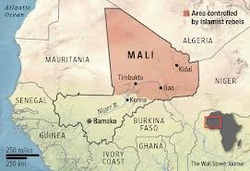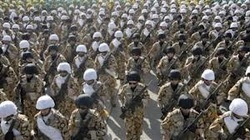 Mali reconciliation on track despite protests, minister says
Related Topics By Tiemoko Diallo BAMAKO | Mon Sep 16, 2013 12:09pm EDT (Reuters) - Protesters threw stones at officials from Mali's newly elected government during a weekend visit to the main northern rebel stronghold, but the reconciliation minister said on Monday that efforts to heal the country's deep social rifts were on track. The government said last week it would hold discussions with all of the groups living in the turbulent north of the country before opening peace talks with Tuareg rebels, in a plan designed to end repeated rebellions in the desert region. Tuareg separatist rebels who took up arms last year signed a ceasefire to allow elections to take place in July and August, but they have not yet disarmed. Their rebellion was hijacked by better armed al Qaeda-linked Islamists, whose occupation of Mali's north led to French military intervention in January. Cheick Oumar Diarrah, minister for national reconciliation and development of the North, and two other government ministers traveled to the town of Kidal on Sunday to meet with local officials ahead of the planned dialogue. Pro-rebel demonstrators, angered that the government was visiting the town before launching peace talks, initially tried to occupy the airport runway to block their arrival, but were dispersed by African peacekeepers, witnesses said. They then pelted the ministers' convoy with stones as it traveled through the town, breaking the windows of some cars. Diarrah played down the protests in an interview on state radio, saying he was pleased with how the meeting had gone. "This very, very minor incident will not divert us from our will to unite all the strands of the Malian nation and reconcile with one another in order to pull Mali out of the current crisis," he said. The Tuareg-led MNLA rebellion seeking independence for the north triggered a coup and subsequent Islamist takeover. Fearing the zone had become a launchpad for hardline Islamist attacks, Paris dispatched thousands of troops who scattered Islamist rebels. A runoff ballot last month elected Ibrahim Boubacar Keita as Mali's new president, restoring civilian rule. According to the interim deal that allowed elections to go ahead, the rebels are to be confined to barracks and Keita has 60 days from naming his government last weekend to open negotiations. However, Diarrah said on Friday that dialogue between all communities was needed to draw up a new "social contract" before those talks could begin. He gave no timetable for the dialogue. Clashes between the army and separatist MNLA rebels near Mali's western border with Mauritania last week highlighted the volatility on the ground despite a 12,600-strong United Nations peacekeeping mission that is being deployed. Both the rebels and army blamed each other for the incident. (Additional reporting by Adama Diarra; Writing by David Lewis and Joe Bavier; Editing by Mike Collett-White) WORLD UNITED NATIONS AFRICA MALI
0 Comments
 A vital debate is raging in the United States over a key question: Does the Assad regime pose a greater threat to international security than the radical Islamist elements fighting to topple the Syrian dictator? And how would a military strike alter the balance? As Congress debates the merits of military action in Syria, concerns are being raised by some observers that hurting the Assad regime could strengthen the al-Qaeda-affiliated groups, thereby doing more harm than good to regional and global security. During these tumultuous and chaotic times in the Middle East, it is more difficult than ever to assemble and update an accurate, comprehensive threat assessment picture, one which takes into account both near and distant dangers, and which can distinguish between security problems based on their level of severity. There is not one uniform view among Israeli defense experts over what outcome would be best for Israel, in light of the fact that no one can know with certainty what will come in Assad’s place. Most observers agree that from Israel’s perspective, the al-Qaeda-affiliated organizations in Syria pose a very real and growing threat, but one which is significantly smaller in scope and more easily contained than the threat posed by a far more powerful axis: Iran, the Assad regime, and Hezbollah. This view is based on the fact that the Syrian regime forms a central component in the Iranian bloc. It is this bloc, on the verge of obtaining nuclear weapons, and with access to unconventional weapons and state-sponsored conventional weaponry, that is the top threat to Israel’s security. Syria is the bridge connecting Tehran to Hezbollah in Lebanon. Bashar Al-Assad has brought Syria closer to Iran and Hezbollah, and today relies on them for his survival. Assad is facilitating the transit of advanced Iranian arms to Hezbollah, as well as supplying it with Syrian-made weapons. Syria is viewed by the Iranian regime as its critical forward base and springboard to eventual regional domination. With Syrian help, Iran has armed Hezbollah with 70-80,000 rockets that are pointed at Israeli cities. Hezbollah’s firepower has the potential to paralyze the Israeli home front in a future war. The most critical threat is the Iranian nuclear weapons program, which is edging forward all the time. If Iran isn’t stopped, Hezbollah, and other terrorist semi-states like Hamas in Gaza, could try to attack Israel while enjoying protection from an Iranian nuclear umbrella. The same pattern can repeat itself on an even larger scale in the future. Iranian-sponsored terrorist networks might attack Western cities with impunity if they are emboldened by a nuclear-armed Iran. The collapse of the Assad regime would deal a serious blow to Tehran and Hezbollah, while significantly improving Israel’s strategic situation. Furthermore, a Syrian regime that is only weakened by a U.S. strike, yet deterred from deploying a chemical weapon again, could in turn deter the entire Iranian network, and give Iran’s Supreme Leader Ayatollah Khameini pause before considering further progress on his nuclear program. According to former military intelligence chief Amos Yadlin,”Iran has all of the capabilities it needs to decide to create a nuclear weapon. The day of the decision could be tonight, when they might choose to break out of the Non-Proliferation Treaty.” U.S. influence and deterrence has never been more needed in the region, and it has never been more lacking. If Iran, the world’s most radical state – whose leaders have publicly declared their desire to see Israel destroyed – gets hold of humanity’s most destructive weapons, the effect on regional security would be devastating. Sunni Arab countries, made up of Gulf states and secular countries like Jordan and Egypt, are all deeply concerned about the potential of nuclear weapons in the hands of Shi’ite Iran. It is impossible to divorce Syria’s use of chemical weapons from the Iranian nuclear weapons program. The Islamic Republic’s Revolutionary Guards Corps is fighting with the Syrian army against the rebels, while thousands of Hezbollah fighters are in Syria too, fighting alongside Assad’s forces. The Iranian-led axis views Syria as a battleground where it can experiment with unconventional weapons and push the boundaries on international prohibitions against weapons of mass destruction. An indecisive response to August’s chemical massacre in Damascus runs the risk of emboldening Iran and its allies. They in turn will continue in their scheme to emerge as leaders of the Muslim Middle East, acquire nuclear weapons, and confront Israel and the moderate Sunni states. None of these concerns negate the dangers from a revitalized al-Qaeda network in Syria. Estimates vary about the number of radical Islamists among opposition fighters. The fact remains that jihadi groups are growing quickly there. They make up some of the most effective fighting units, and are thriving in the power vacuum and deadly battlegrounds of Syria. The jihadi presence in Syria has begun infecting neighboring states too, such as Lebanon and Iraq, and is likely to spread to other territories experiencing power vacuums, like Egypt’s troubled Sinai Peninsula, while threatening stable countries such as Jordan. A spillover of terrorists to other lands is inevitable. While the Sunni radical threat is very real, it is also limited in scope at this time, as far as Israel is concerned. Small terrorist groups can fire rockets and mortars at Israel, and launch cross-border attacks. But this is a threat the IDF can contain, and for which it has spent many months preparing. In contrast, a war with the Iranian axis would take on a significantly higher magnitude. When weighing the extent of the danger presented by pro-al-Qaeda groups in Syria, one might also factor in the likelihood that they will be engaged in a power struggle, sectarian warfare, and battles with more moderate elements of the Free Syrian Army for years to come. This subsequent conflict could hamper their ability to organize serious attacks. To be sure, the security problem posed by jihadis is no laughing matter. As they continue to raid weapons storehouses once owned by the Syrian army, Israel must think ahead about a scenario involving a raid by al-Qaeda on a chemical weapons facility controlled by the Assad regime. A reality in which al-Qaeda is armed with chemical weapons can never be accepted. But right now, Iran is just a few months away from a working nuclear weapon, should it decide to obtain one. Its ally in Damascus massacred more than 1,400 civilians with sarin gas, and its ally in Lebanon stockpiles more rockets and missiles than any arsenal in the hands of most modern militaries. For all of these reasons, a failure to deter the Iran-Syria-Hezballoh axis now could result in a future security deterioration, the outcome of which would be more extensive than any immediate threat posed by jihadis in Syria. Yaakov Lappin is the Jerusalem Post’s military and national security affairs correspondent, and author of The Virtual Caliphate (Potomac Books), which proposes that jihadis on the internet have established a virtual Islamist state. |
PTAH HAS CREATED "THE SOURCE OF ALL MEDIA". TO HELP KEEP US STAY INFORMED .ON WHATS HAPPENING IN ,ON, AND AROUND OUR UNIVERS. Archives
September 2013
Click to set custom HTML
Categories |
|
|
- KAM
- don't jump into the pacific ocean or evacuate earth 'yeah nothing like that"
- sum moore
- Now it'z Our TIME
- The 1
- multipolar harmonicz
- laptop gate
- zaporozhye nuclear power plant news
- fukushima
- fallout/ radiation
- BOARDER BLOG
- terrorist state
- food now
- Climate change we must Change
- FOCUS FILMZ POLITICAL
- IZM GALLERY
- IZM TV/NEWS
- YOU KNOW WHO IT IZ
- ON YOUR BACK & BEYOND STYLE
- izm party
- Global biz
- ASCENDING MASTERS
- WHAT'Z UP WITH IT
- WORLD WIDE PEACE AND LOVE OR WAR
- JOURNEY OF PTAH
- INNOVATION
- tech/ cyber.S
- colonial semi yuanizm
- WHAT IZMIST DO
- GOLDEN AGE
- focus filmz
- cosmic alignment 2012
- THE PEACE AND LOVE FOUNDATION INC
- PROBLEMS IN LIES THE SOLUTION
- planet DISNEY
- melting pot
- fallout/radiation videos and info
- planet Elizabeth Taylor
- FOCUS FILMZ POLITICAL ON LOCATION
- we R the children
- books of knowledge
- Nu age
- TRUTHIZM" they will watch you die"
- CHEIF
- source of allmediaizm
- ptah messages from the beyond"
- COVID/19
- HEMP & CANOPY NEWZ
- CHINA BLUEIZM
- 4LIGHT IZ ZOUND

 RSS Feed
RSS Feed
